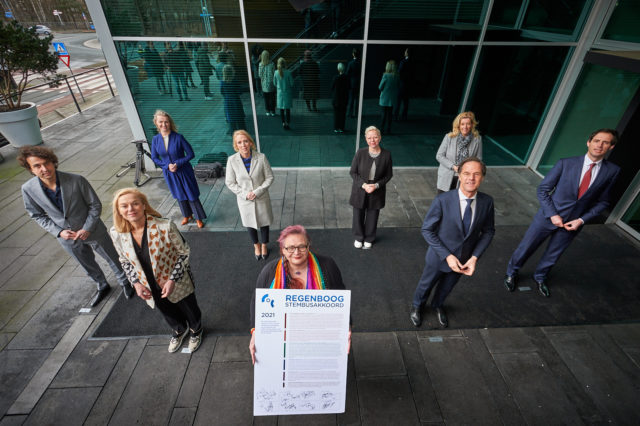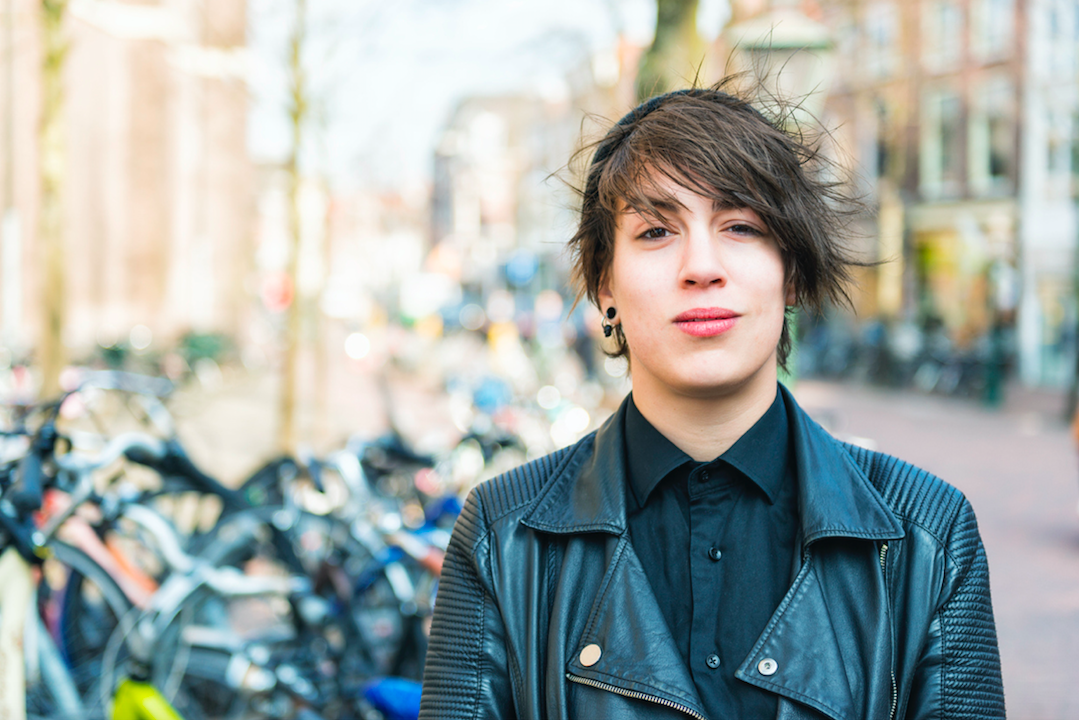Jacques Zonne was in his early 20’s when he fell victim to conversion practices in the Netherlands. Decades later, he still struggles with the aftermath. “Every time I tell my story, the trauma comes back to me.”
Zonne grew up in an evangelical family in the 1960’s and 1970’s. He knew from an early age that he was gay, but kept his identity a secret. This changed after he accepted an invitation from the Christian bookstore where he volunteered to go on a two-week trip to the countryside. “The first week was fun,” he tells GO. “We hung out, prayed and sang songs. During the second week, things started to change.” The people running the evangelical retreat either suspected or had somehow found out he was gay. It was the start of a two year ordeal, which Zonne says left him briefly “brainwashed.”
Fortunately, times have changed, and the Netherlands may soon join the list of countries worldwide that have banned conversion therapy.
There is no credible scientific research to prove that a person’s gender- or sexual identity can be changed, and even though conversion practices are not supported by accredited medical associations and experts, they are ongoing.
Conversion practices as we know them now can be traced back to 1899, when a German psychiatrist called Albert von Schrenck-Notzing said he turned a gay man straight through 45 hypnosis sessions and a few trips to a brothel. From then on, plenty of experimentation was done around the idea of subverting sexual identity; in the 1920’s an Austrian endocrinologist tried to ‘cure’ several gay men by castrating them and giving them transplanted testicles from heterosexual men. In the 1970’s, New Orleans-based psychiatrist Robert Galbraith Heath administered a combination of electroshocks and heterosexual pornography, and hired sex workers as ‘therapy.’ The American Psychiatric Association stopped qualifying queerness as a mental disorder in 1973. It took the World Health Organization (WHO) another 20 years to remove it from the International Classification of Diseases database.
Last year, an investigation ordered by the Dutch House of Representatives confirmed that within the Netherlands, a country of just over 17 million people, there are at least fifteen groups and individual practitioners who actively try to ‘fix’ queerness. Their rhetoric is often cloaked in faux acceptance; coming to terms with one’s identity is encouraged. Then comes the catch: People are not supposed to ever act on their desires, and very frequently they are encouraged to change. Different solutions are offered, from talk therapy to rituals aimed at driving out inner demons.
As in Zonne’s case, conversion practices are usually fueled by religious beliefs. Though the Dutch investigation brought forth only healers from orthodox and evangelical Christian traditions, who claim that the Bible doesn’t allow for queerness, conversion practices do not stop there.
Dino Suhonic, founder of Stichting Maruf, an organization for queer Muslims, tells GO that Muslim clerics administer similar ‘treatments,’ “From doing specific prayers and carrying a talisman around or putting it under your pillow, to being ordered to abstain from masturbation. And if that doesn’t work, there can be exorcism-type ceremonies.” Suhonic notes that Muslim clerics often seem to borrow their approach from evangelical Christian counterparts. “It’s like they don’t know how to handle it and end up doing things that aren’t common in Islam at all.”
Over the years, several people have come to Suhonic for help. “Many have internalized the idea that being queer and being Muslim are incompatible. But when we talk about it together, we realize: We’re a living example of the fact that it’s possible. We embody both.”
Both Suhonic and Zonne say that shame presents a big hurdle in two significant ways. There is the baseline discomfort and fear LGBTQ+ people in very religious communities experience. On top of that, if they’ve undergone some form of conversion attempt, people feel ashamed to admit it and have a hard time talking about the damage it’s caused. “So what we know about [conversion therapy experience], is really only the tip of the iceberg,” Suhonic says.
Zonne remembers being completely isolated at the Christian camp. “They called my parents and outed me, and said I wanted to stay on the farm.” He was made to believe his family rejected him and his money and ID were taken. Being in a rural area with no transportation or money of his own, he was trapped. The people running the camp said that ‘the devil had a hold on him,’ so Zonne was subjected to an exorcism-attempt. “They whispered, kept getting louder, and pushed their hands into my whole body. The leader screamed: ‘Devil, leave this man!,’” he told Dutch magazine Linda in 2020. Afterwards, Zonne felt dirty. “I hoped that staying would make me straight. They abused that weakness.”
The virtues of having a wife and children were pushed on him again and again, he says. The camp leader promised that Jesus would save him. Only then his parents would welcome him again. “They broke me emotionally so they could mold me however they saw fit. They could tell me anything. I believed I was cured,” he tells GO.
So little is known about what goes on behind closed doors that it took the Dutch government years to realize the harmful nature of conversion practices. The grassroots work around building awareness is done by individual victims like Zonne, and LGBTQ+ rights organizations like advocacy group COC Netherlands, founded in 1946 and the oldest of its kind in the world. COC published Zonne’s story in 1980, when public awareness about conversion practices began to grow.
About a decade ago, it became clear that conversion practices were routinely being covered by health care providers as ‘therapy’ and the COC began applying consistent political pressure, says spokesperson Philip Tijsma. “The Secretary of Health at the time put a stop to that. That’s when we said: This needs to be outlawed. We’ve been working towards that goal ever since.”
The most recent push toward an actual law to fully ban conversion therapy in the Netherlands was initiated in 2019 by House representative Vera Bergkamp, together with representative Kirsten van den Hul. Their first motion proposing to outlaw passed with a majority vote in the House and prompted the investigation. Once they had irrefutable proof that conversion practices were indeed still happening, Bergkamp and Van den Hul filed a second motion in 2020. It passed with an even bigger majority vote than the year before. The only two parties voting against the motion were Christian conservatives.
The investigation made a big difference, says Van den Hul. “The initial response when we requested the investigation was skepticism, because not that many complaints were being filed about it.” This bothered her, because she knew that wasn’t in line with reality. “I’ve spoken to so many people who have dealt with this, who talk about systemic repression at home, at school and in church.”
Only five countries in the world currently have a law banning conversion practices; after Malta became the first in 2016, Ecuador, Taiwan, Brazil and Germany followed. In the U.S., twenty out of fifty states currently have some type of legislation in place, but there is no nationwide ban.
While most of these laws focus on protecting minors, the Dutch legislators are also asking the government for a ban for vulnerable adults. They are also advocating for a support system for victims. “Even after people leave these [evangelical] communities behind, they often still suffer because of what they’ve been through,” Van den Hul says.
With the Netherlands’ national elections happening later this month, COC is working to make sure the anti-conversion therapy law will be adopted as soon as the new government is installed. They’ve made a so-called Rainbow Agreement, a list of promises to the LGBTQ+ community, which was recently signed by leaders of eight major political parties. The anti-conversion therapy law has been added to that list, says Tijsma, “because these practices simply have to stop.”

Zonne hopes the time has finally come. His two-year long captivity at the Christian camp culminated in a ritual that was meant to seal his rebirth as a straight man: “I was baptized in a big pool with an audience, even though I’d already been baptized as a child. They wanted to show me off: Look, this is the gay man we cured.” Zonne was paraded around and opted to stay, thinking it was the best way to ensure he wouldn’t relapse. It wasn’t until he had a conversation with another supposedly cured man — who had married a woman and had his success story printed in an evangelical book, but admitted that he still looked at men every day — that Zonne realized what had happened to him. “That’s the moment I woke up from my brainwashed state.”
Twice, he tried to escape. The first time, Zonne asked acquaintances who worked at a Christian book store in Amsterdam for help during a visit. Instead of taking him to his parents house, they drove him back to the camp. The second time, Zonne fled the farm by himself on a moped, but got lost. Ultimately, a queer-friendly congregation in The Hague came to his aid. After a desperate Zonne called the congregation’s pastor, he arranged that another LGBTQ+ friendly pastor would take him in. Zonne left on his moped once more, this time knowing he was headed to a safe destination.
Once he got out, it took another five years until Zonne reconciled with his parents. And though decades have passed, he doesn’t think he’ll ever fully recover. “Every time I tell my story, the trauma comes back and destabilizes me. That’s why I continue to fight, so this doesn’t happen to other people.” Zonne thinks outlawing conversion practices is an important step, but worries that practitioners will go underground to escape the scrutiny of regulators.
Van den Hul understands that concern. “It’s true, these practices are very hard to control. Many people offering them aren’t actual doctors and operate out of sight.” In addition to the law, the country needs to work towards greater visibility and understanding of the LGBTQ+ community, she says. “LGBTQ acceptance should be on the curriculum in every school. And the police need to be more aware of violence against LGBTQ people, so they always feel safe to file a report if something happens to them.”


What Do You Think?